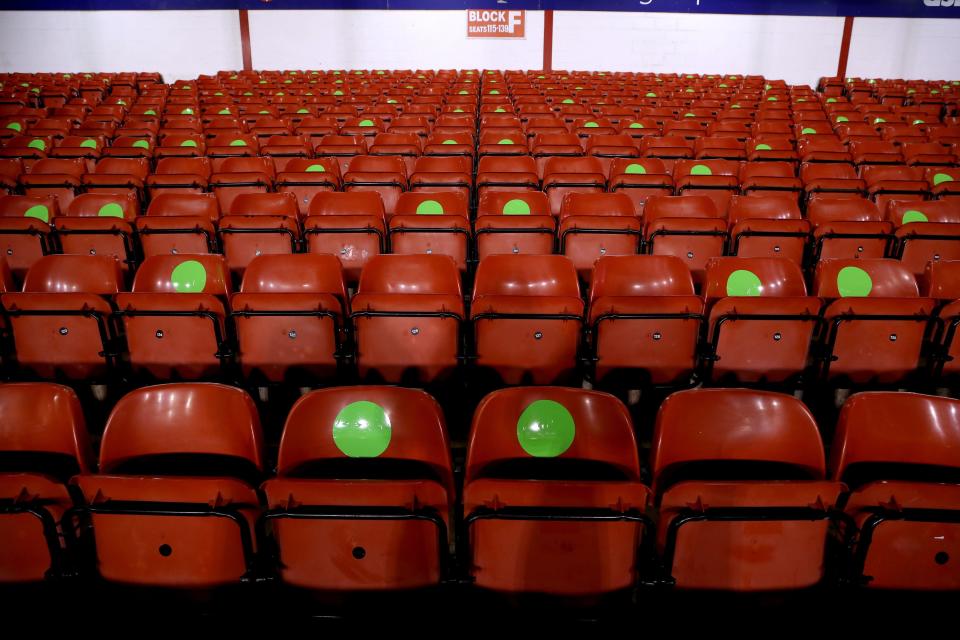Government admits ‘inconsistency’ over no fans at football matches after 1,000 people attend London Palladium

Culture secretary Oliver Dowden admitted that there are “inconsistencies” in the government’s approach to handling the coronavirus pandemic, following the staging of events inside the London Palladium with 1,000 people in attendance while open-air stadia remain closed.
The Premier League and English Football League have backed the Let Fans In campaign after seeing the planned 1 October return of fans scrapped due to a large rise in the number of coronavirus cases across the country.
Dowden faced questions from the Digital, Culture, Media and Sport select committee on Wednesday to attempt to explain why fans continue to be locked out of football matches and other sporting events, despite the successful piloting of their return across August and September. The calls for supporters to be allowed back into events have grown ever larger this week after it emerged that 1,000 people were allowed into the Palladium for ‘An Evening with Arsene Wenger’, with the former Arsenal manager launching his new book. Dowden himself has also attended the theatre in recent days.
Posed by MP Steve Brine’s question of how so many people could be allowed to gather indoors when similar numbers are currently banned from doing so outside at a stadium, Dowden accepted that it made little sense.
“Of course I accept people’s frustration at the inconsistency there,” Dowden told the DCMS select committee on Wednesday.
“The simple reason for it is that we had sports on a path to return on 1 October and to have socially distanced spectators, that’s what we wanted to happen.
“The clear advice from the scientists was that we should be imposing restrictions and not further easements. It is worth noting the difference in terms of quantity. You would have a lot of people going into stadiums week in and week out up and down the country.
“Clearly people have noticed the London Palladium but it’s a different scale. If people are unhappy with indoor performances going ahead it’s a separate decision whether we stop those.
“If we had gone ahead on 1 October people would have seen very large numbers of fans going into stadiums at the very time that the virus was rising rapidly. This is not saying we are not going ahead with it, this is simply a pause.”
The Independent revealed on Wednesday that the process of fans travelling to events was the main concern for the government, having conveyed their fears in a conference call with major sporting bodies just two days before the decision was made to postpone the return of supporters. However, evidence shows that just one-third of EFL supporters use publis transport - a stat that Dowden was unaware of - which would have significantly reduced the risk that a socially-distanced crowd would present.
"We were ready to go, the pilots had been successful and we were ready to go from October 1,” he added.

"We had to pause it given the rapid expansion of the disease. It is worth noting it is not just in the stadium - it's the journey to the stadium both on issues such as public transport, people are likely to want something to eat or drink on the way, there is lots of other social contact.
"That's not to say those things can't be mitigated, they can be. But we have to accept that in permitting that to go ahead from 1 October we would have been having an easing in restriction, an increase in social interaction, which could have aided the spread of the disease at the same time as we were imposing lots of further restrictions.
"When we get to the point where we have confidence we have got the disease under control in the sense of we're not on this rapid upward curve, I would rapidly want to return this decision.
"Through things like the Sports Technology and Innovation Group we are continuing to look at further work we can do to further increase our assurance about minimising the risk around this.
"We are ready to go as soon as we get the starting gun fired.”
Dowden returned to this belief when asked for the reasoning behind the continuation of locking fans out, although this week’s increased restrictions fall in line with that thinking that “now is not the time” for sport to reopen its doors - something Dowden reiterated on Wednesday.
“The risk would have been the other way round,” he added. “People will have seen very large numbers of fans going into stadiums at the same time that the virus was rising rapidly, and I think they would have said quite rightly why are you choosing to do it at this point when we’re imposing all these other restrictions?”
Read more
‘It’s optics, not facts’: Football fights back to let fans return
Government says ‘no EFL club will go bust’ in latest criticism of PBP

 Yahoo Sport
Yahoo Sport 





































